Pole zenith star - Study guides, Class notes & Summaries
Looking for the best study guides, study notes and summaries about Pole zenith star? On this page you'll find 46 study documents about Pole zenith star.
All 46 results
Sort by
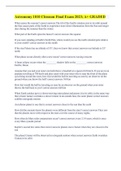
-
Astronomy 1010 Clemson Final Exam 2023; A+ GRADED
- Exam (elaborations) • 7 pages • 2023
- Available in package deal
-
- $7.99
- 5x sold
- + learn more
What causes the seasons? correct answers The tilt of the Earth's rotation axis to its orbit around the Sun causes parts of the Earth to experience more direct illumination from the Sun and longer days during the summer than the winter. What part of the Earth spins the fastest? correct answers the equator If you were standing at Earth's North Pole, where would you see the north celestial pole relative to your zenith? correct answers at the zenith If the star Polaris has an altitude of ...

-
Astronomy 1010 Clemson Final Exam with Complete & Verified Solutions
- Exam (elaborations) • 14 pages • 2023
-
- $10.49
- + learn more
What causes the seasons? - ANSWER The tilt of the Earth's rotation axis to its orbit around the Sun causes parts of the Earth to experience more direct illumination from the Sun and longer days during the summer than the winter. What part of the Earth spins the fastest? - ANSWER the equator If you were standing at Earth's North Pole, where would you see the north celestial pole relative to your zenith? - ANSWER at the zenith If the star Polaris has an altitude of 35°, then we know that ...
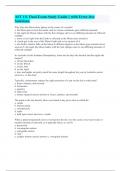
-
AST 111 Final Exam Study Guide || with Error-free Solutions.
- Exam (elaborations) • 22 pages • 2024
-
Available in package deal
-
- $13.39
- + learn more
Why does the Moon show phases in the course of a month? a. the Moon glows from the inside, and its various continents glow different amounts b. the angle the Moon makes with the Sun changes and we see differing amounts of reflected sunlight c. more or less light from the Earth is reflected as the Moon turns around it d. clouds get in the way of the Moon's light and cover up parts of it e. the Earth's shadow falls on the Moon to different degrees as the Moon goes around correct answers b. ...

-
Astronomy 1010 Clemson Final Exam with Complete & Verified Solutions
- Exam (elaborations) • 14 pages • 2023
-
- $11.48
- + learn more
What causes the seasons? - ANSWER The tilt of the Earth's rotation axis to its orbit around the Sun causes parts of the Earth to experience more direct illumination from the Sun and longer days during the summer than the winter. What part of the Earth spins the fastest? - ANSWER the equator If you were standing at Earth's North Pole, where would you see the north celestial pole relative to your zenith? - ANSWER at the zenith If the star Polaris has an altitude of 35°, then we know that ...

-
Astronomy 1010 Clemson Final Exam with Complete & Verified Solutions
- Exam (elaborations) • 14 pages • 2023
-
Available in package deal
-
- $9.49
- + learn more
Astronomy 1010 Clemson Final Exam with Complete & Verified Solutions What causes the seasons? - ANSWER The tilt of the Earth's rotation axis to its orbit around the Sun causes parts of the Earth to experience more direct illumination from the Sun and longer days during the summer than the winter. What part of the Earth spins the fastest? - ANSWER the equator If you were standing at Earth's North Pole, where would you see the north celestial pole relative to your zenith? - ANSWER at the zenith...
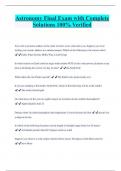
-
Astronomy Final Exam with Complete Solutions 100% Verified
- Exam (elaborations) • 9 pages • 2024
- Available in package deal
-
- $13.99
- + learn more
Astronomy Final Exam with Complete Solutions 100% Verified You write your home address in the order of street, town, state and so on. Suppose you were writing your cosmic address in a similar manner. Which of the following is the correct order? ️️Earth, Solar System, Milky Way, Local Group In what location on Earth could an eager math student NOT use her solar-power calculator at any time at all during the course of a day in June? ️️the South Pole What makes the star Polaris s...

-
Astronomy 1010 Clemson Final Exam with Complete & Verified Solutions
- Exam (elaborations) • 14 pages • 2023
-
- $12.49
- + learn more
Astronomy 1010 Clemson Final Exam with Complete & Verified Solutions What causes the seasons? - ANSWER The tilt of the Earth's rotation axis to its orbit around the Sun causes parts of the Earth to experience more direct illumination from the Sun and longer days during the summer than the winter. What part of the Earth spins the fastest? - ANSWER the equator If you were standing at Earth's North Pole, where would you see the north celestial pole relative to your zenith? - ANSWER at the ...
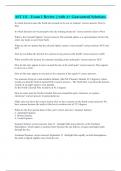
-
AST 111 - Exam 1 Review || with A+ Guaranteed Solutions.
- Exam (elaborations) • 7 pages • 2024
-
Available in package deal
-
- $10.99
- + learn more
In which direction does the Earth turn around on its axis of rotation? correct answers West to East In which direction do we preceptive the sky turning around us? correct answers East to West What is the Celestial Sphere? correct answers The celestial sphere is a representation of how the entire sky looks as seen from Earth. What are the two points that the celestial sphere seems to turn around? correct answers NCP and SCP How do we define the horizon for a person at any point on the...
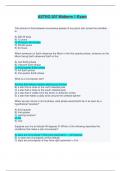
-
ASTRO 207 Midterm 1 Exam - Questions with Verified Answers
- Exam (elaborations) • 11 pages • 2024
-
- $16.99
- + learn more
ASTRO 207 Midterm 1 Exam - Questions with Verified Answers The amount of time between successive passes of any given star across the meridian is: A) 365.25 days B) 12 years C) 23 hours, 56 minutes D) 26,000 years E) 24 hours When someone on Earth observes the Moon in the first-quarter phase, someone on the Moon facing Earth observes Earth in the: A) new Earth phase B) crescent Earth phase C) third-quarter Earth phase D) full Earth phase E) first-quarter Earth phase What is a circumpolar star? ...
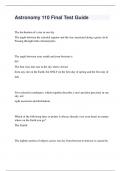
-
Astronomy 110 Final Test Guide
- Exam (elaborations) • 87 pages • 2024
-
Available in package deal
-
- $15.99
- + learn more
The declination of a star in our sky The angle between the celestial equator and the star, measured along a great circle Passing through both celestial poles. The angle between your zenith and your horizon is 90°. The Sun rises due east in the sky when viewed from any site on the Earth, but ONLY on the first day of spring and the first day of fall. Two celestial coordinates, which together describe a star's position precisely in our sky, are: right ascension and declination ...

Study stress? For sellers on Stuvia, these are actually golden times. KA-CHING! Earn from your study resources too and start uploading now. Discover all about earning on Stuvia


